Due to the Covid-19 pandemic the following screenings in March and April did NOT take place, but we are keeping them listed here for the sake of posterity, and hopefully these wonderful films will appear on a future schedule.
Sat 3/21 at 11:30 AM — Traffic In Souls — Music Box
Mon 3/30 at 7:00 PM — Shy People — Music Box
Sat 4/4 at 11:30 AM — In Spring — Music Box
Sat 4/11 at 7:00 PM — Six American Families — Chicago Filmmakers
Wed 4/15 at 7:30 PM — The Trial of Vivienne Ware — NEIU
Mon 4/27 at 7:00 PM — The Masque of the Red Death — Music Box
Programmed and Projected by Julian Antos, Becca Hall, Rebecca Lyon, Kyle Westphal, and Cameron Worden.
Research Associate: Mike Quintero
Our screenings are held at multiple venues around Chicago, including:
• The Auditorium at Northeastern Illinois University (inside of Building E)
3701 W Bryn Mawr Ave — Directions • Campus Map
Tickets: General Admission: $7 • NEIU Students: $3
• The Music Box Theatre
3733 N Southport Ave — Directions • Parking
Tickets: $10 or $11
• Chicago Filmmakers
5720 N Ridge Ave — Directions • Parking
Tickets: $8
SEASON AT A GLANCE
JANUARY
Sat 1/4 at 11:30 AM …………….. The Student Prince in Old Heidelberg ………… Music Box
Wed 1/8 at 7:30 PM …………….. My Favorite Wife ………………………………………………….. NEIU
Wed 1/15 at 7:30 PM …………… Old Joy …………………………………………………………………… NEIU
Wed 1/22 at 7:30 PM …………… Love Me Tonight …………………………………………………… NEIU
Mon 1/27 at 7:00 PM …………… Portrait of Jennie ………………………………………….. Music Box
FEBRUARY
Wed 2/5 at 7:30 PM ……………….. Freud …………………………………………………………………… NEIU
Sun 2/9 at 7:30 PM ………………… Uzi’s Party (& more) …………………………………… Music Box
Mon 2/10 at 7:00 PM ……………… Disco Godfather …………………………………………. Music Box
Sat 2/15 at 11:30 AM ……………… Bare Knees …………………………………………………. Music Box
Wed 2/19 at 7:30 PM ………………. Angel Face ………………………………………………………….. NEIU
MARCH
Wed 3/4 at 7:30 PM …………. Uncle Boonmee Who Can Recall His Past Lives ……… NEIU
Sat 3/21 at 11:30 AM ……….. Traffic in Souls …………………………………………………. Music Box
Mon 3/30 at 7:00 PM ……….. Shy People ………………………………………………………… Music Box
APRIL
Sat 4/4 at 11:30 AM …………….. In Spring ……………………………………………………….. Music Box
Sat 4/11 at 7:00 PM …………….. Six American Families …………………. Chicago Filmmakers
Wed 4/15 at 7:30 PM …………. The Trial of Vivienne Ware …………………………………… NEIU
Mon 4/27 at 7:00 PM …………. The Masque of the Red Death ……………………… Music Box
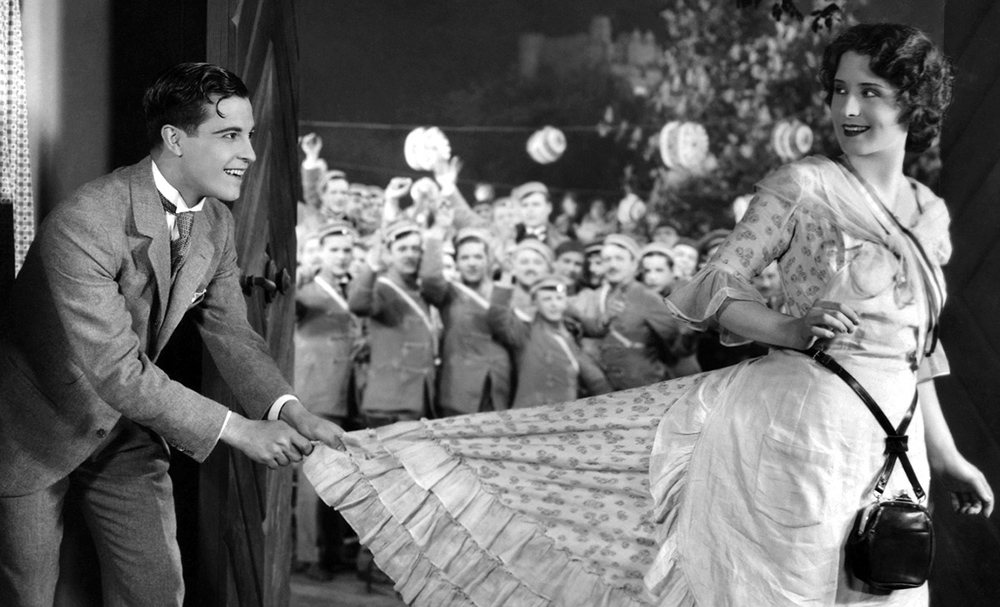
Saturday, January 4 @ 11:30 AM / Music Box Theatre
THE STUDENT PRINCE IN OLD HEIDELBERG
Directed by Ernst Lubitsch • 1927
Live organ accompaniment by Dennis Scott
Ernst Lubitsch had already acquitted himself capably in bringing the wit of Oscar Wilde to the screen without the benefit of spoken dialogue in his version of Lady Windermere’s Fan, so why wouldn’t he attempt Sigmund Romberg’s famous operetta The Student Prince in Old Heidelberg without the music? As in Lubitsch’s best work, the perverse constraints of the set-up serve to elevate the emotional stakes and refine the visual grammar. Ramon Novarro stars as Crown Prince Karl Heinrich, a pampered brat whose life only becomes human-sized again when he and his tutor Dr. Jüttner (Jean Hersholt) take in the earthy pleasures of Old Heidelberg. Karl soon falls for Kathi (Norma Shearer), the waitress at a Heidelberg biergarten and a spunky antidote to the foreordained strain of royal responsibility. Budgeted at more than a million dollars, The Student Prince represents M-G-M’s late silent style at its most spendthrift. (Although some footage was shot in Heidelberg, Laurel Canyon was ultimately deemed an adequate substitute.) “Lubitsch took his tongue out of his cheek when he directed this special,” lamented Variety, which oddly held the film’s immaculately realized high romanticism against it. “It’s not farce and it’s not drama. Just a pretty love story of peaches and cream that may have put perfume in the director’s cigars as he supervised.” (KW)
105 min • Metro-Goldwyn-Mayer • 35mm from Warner Bros.
Film Stock: AGFA
Preceded by: “The Leopard’s Spots” (Walter Lantz and Clyde Geronimi, 1925) – 9 min – 16mm
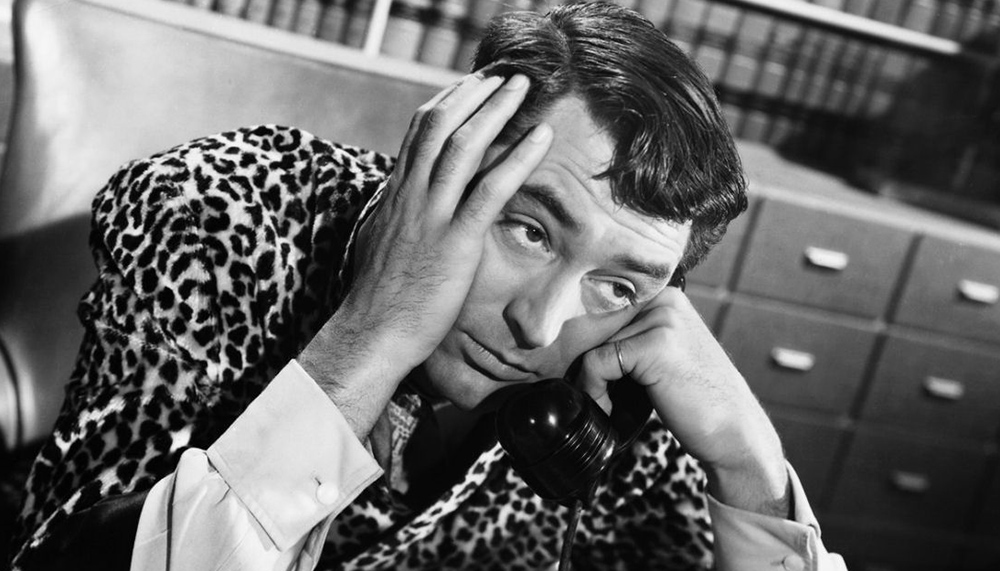
Watch the trailer for MY FAVORITE WIFE
Wednesday, January 8 @ 7:30 PM / NEIU
MY FAVORITE WIFE
Directed by Garson Kanin • 1940
Hollywood has never been an industry willing to let a good formula go to waste. So it was that RKO shamelessly reconstituted Columbia Pictures’ Leo McCarey-directed screwball sensation The Awful Truth into their own quasi-remake, once more pairing Truth stars Irene Dunne and Cary Grant as feuding spouses under the stewardship of McCarey (producing this time). Whereas The Awful Truth saw its upper-crust leads locked in a comparatively banal struggle over “irreconcilable differences,” My Favorite Wife bent over backwards to envision a scenario in which any and all mishaps, misunderstandings, and miscommunications could flourish, unhampered by reason, believability, or potential legal ramifications. This time out, Dunne plays Ellen Arden, a wife and mother who’s spent seven years shipwrecked on a remote island. She returns to civilization to find her husband Nick (Grant) has on that very day had her declared dead and has summarily remarried. Nick’s reunion with his legally deceased wife is initially a happy one, but his fumbling attempts to broach the topic of annulment with his new bride and the later discovery that Ellen was stranded alongside a hunky male consort (Grant’s longtime roommate Randolph Scott, showing a healthy amount of skin) ensure that, in classic screwball fashion, no good coupling goes unpunished. Preserved by the Library of Congress. (CW)
88 min • RKO • 35mm from Library of Congress, permission Warner Brothers
Film Stock: ORWO Lab: Library of Congress
Preceded by: “Hollywood Steps Out” (Tex Avery, 1941) 7 min – 16mm
**AN EXPANDED CELEBRATION OF SUPER 16**
Throughout 2020, CFS celebrates fifty years of Super 16mm. Look out for the “Super 16” note under select screenings!
Invented by Swedish cinematographer Rune Ericson and first used on Blushing Charlie (Vilgot Sjöman, 1970), Super 16 expanded the aspect ratio of regular 16mm from 1.33 to 1.66 by recentering the camera lens and opening up the camera aperture to cover the area normally used for the optical soundtrack. The format became widely used by independent filmmakers, like Spike Lee (She’s Gotta Have It) and Leslie Harris (Just Another Girl on the IRT), who could now afford to shoot feature films in theatrical aspect ratios for less than half of the cost of 35mm.
Aside from its budgetary benefits, Super 16 is uniquely beautiful. “Blowup” prints on 35mm maintain the distinctive and hypnotizing grain structure of 16mm, and smaller cameras mean lighter crews and easier flexibility for shooting in tight locations. It’s a format just as important and beautiful as CinemaScope, Todd-AO, and VistaVision — we’re pleased to give Super 16 its due!
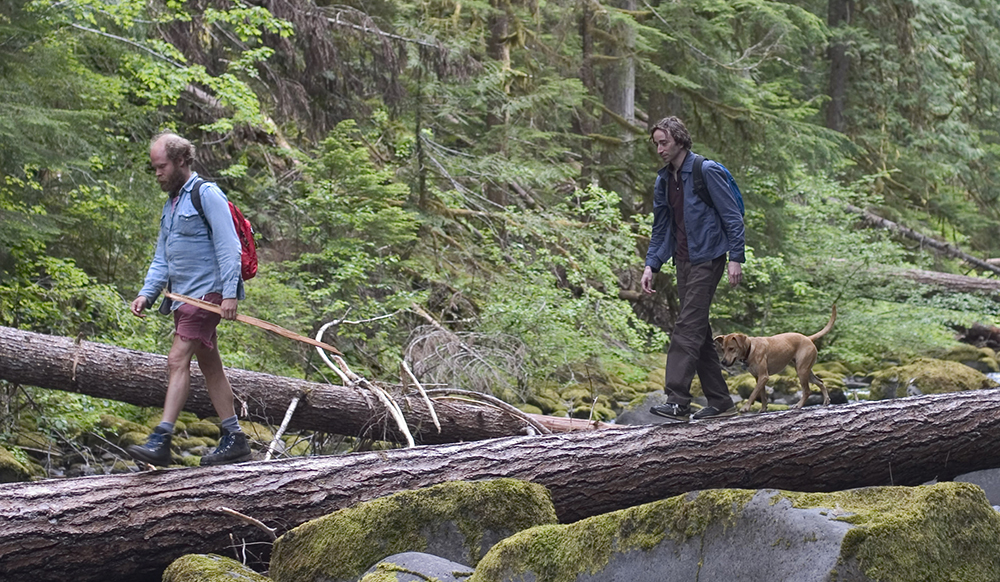
Wednesday, January 15 @ 7:30 PM / NEIU
OLD JOY
Directed by Kelly Reichardt • 2006
A stunning, gentle film about the quiet dissolution of friendship that happens without anyone stopping to notice, Old Joy stars Will Oldham and David London as a pair of old friends who take a roadtrip in an iconic brown Volvo to a hot spring in the Oregon woods. Adapted from a short story written by Kelly Reichardt’s frequent collaborator Jonathan Raymond (Wendy and Lucy, Night Moves, and Meek’s Cutoff), Old Joy was described by Reichardt as a “New Age Western.” Without a horse in sight, it combines the myth of the West with the sadness and uncertainty of post-9/11, talk-radio-infused America. The film was shot on an Aaton A-Minima Super 16mm camera, which was small enough to fit in a backpack and travel into the forest with a tiny crew. Limited by the camera’s half-size magazine to five-minute takes, Reichardt recalls, “For me, keeping the apparatus small is how I work best. I just want to make a film where there are no walkie-talkies or Blackberrys. I just want to go off with a group of friends. I’m better at making films that are private environments. It’s less excess, which means I won’t have a dolly shot, but that’s okay.” (JA)
Screening in honor of the 50th anniversary of the Super 16 format!
76 min • filmscience • 35mm from Chicago Film Society Collections, Permission Janus
Film Stock: Kodak 2383 (2006) Lab: DuArt
Preceded by: “Portland” (Greta Snider, 1996) – 12 min – 16mm from Canyon Cinema
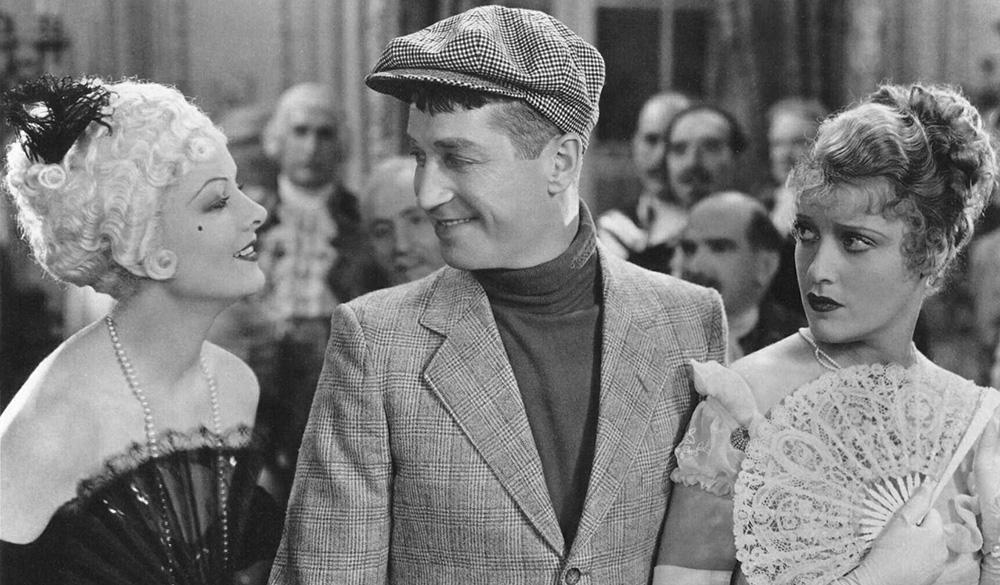
Watch the trailer for LOVE ME TONIGHT
Wednesday, January 22 @ 7:30 PM / NEIU
LOVE ME TONIGHT
Directed by Rouben Mamoulian • 1932
The frothy, continental musical was something of a cottage industry for Paramount Pictures in the early sound era, but Rouben Mamoulian had something different in mind from the comparatively sedentary films set in well-furnished rooms that the studio was putting out. Favoring fluid, promenading camerawork and bombastic cinematic rhythms inspired by European surrealists like René Clair, Love Me Tonight showed that the movie musical could use more than just songs to prove its musicality, revolutionizing the form by moving its setpieces down boulevards and straight through windows and imbuing whole towns with the spirit of a tune. Maurice Chevalier stars as a lowly tailor who falls for Jeannette MacDonald’s haughty princess. Hamstrung by their class difference, he presents himself to her as a baron and launches a cascade of double entendres amidst a campaign to thaw her heart. Furnished with wall-to-wall hits courtesy of songwriting team Rodgers and Hart (most famously Chevalier’s signature tune “Isn’t It Romantic?,” which anchors one of the film’s most charming flights of fancy) and a scene-stealing supporting cast (particularly ne’er-do-well Charles Ruggles and a gloriously horny Myrna Loy), Love Me Tonight indulged heedlessly in all of the pleasures the movie musical could thus far offer, earning it a vaunted status as one of the genre’s most reliably intoxicating offerings. (CW)
89 min • Paramount • 35mm from Universal
Preceded by: Betty Boop in “Betty Boop’s Big Boss” (Fleischer Brothers, 1933) – 7 min – 16mm
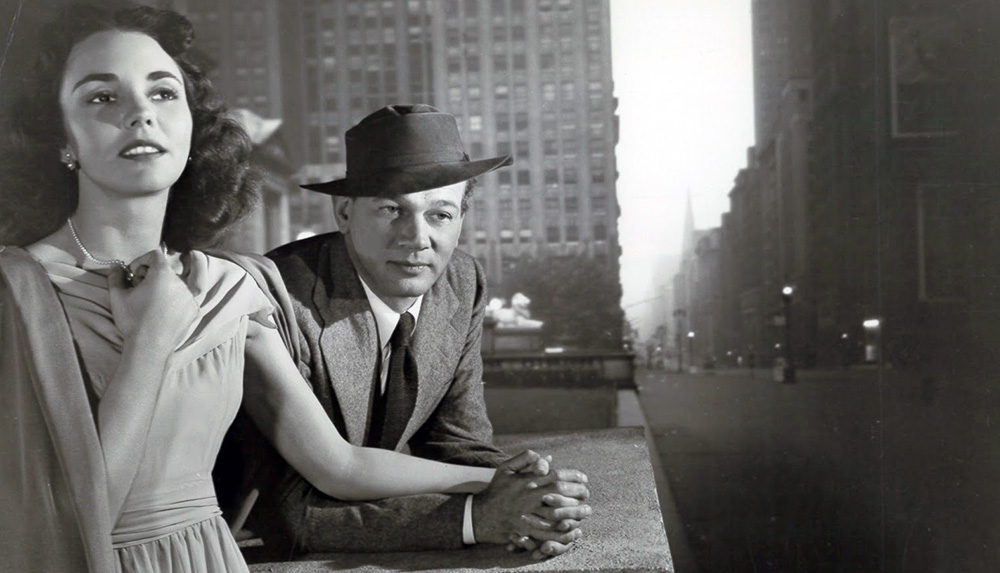
Watch the trailer for PORTRAIT OF JENNIE
Monday, January 27 @ 7:00 PM / Music Box Theatre
PORTRAIT OF JENNIE
Directed by William Dieterle • 1948
There are supernatural romances and then there’s Portrait of Jennie — an unassailable work of visionary delirium and towering claptrap that is easily the strangest film ever recalled fondly by your TCM-loving aunt. Starving artist Eben Adams (Joseph Cotten) doesn’t know it yet, but one day he’ll graduate from turning out middle-aged juvenilia like flower and lighthouse paintings to creating works worthy of being hung in the Metropolitan Museum of Art. His artistic maturation is accelerated by a chance encounter in Central Park with Jennie (Jennifer Jones), a flesh-and-blood Gibson Girl with the diction and dress of an earlier generation. Her apparition reappears to Eben periodically, each time a little older and a little more plausible as a romantic partner. A costly flop upon its belated release, the film embodied the obsessive zeal of producer David O. Selznick, but no amount of demonstrable “good taste” (music from Debussy, quotes from Euripides and Keats) could ground the material’s innately surrealistic freak flag. A ghost story unmoored in time, Portrait of Jennie reaches back to silent cinema to find its most expressive and idiosyncratic aesthetic effects, summoning tinting and Magnascope back from a watery grave in the stupendous final reel. Cinematographer Joseph August would die of a heart attack before the production was completed, literalizing the film’s central conceit of an artwork dictated from the beyond. (KW)
86 min • The Selznick Studio • 35mm from The Walt Disney Company
Preceded by: “Closed Mondays” (Bob Gardiner, Will Vinton, 1974) – 8 min – 35mm

Wednesday, February 5 @ 7:30 PM / NEIU
FREUD
Directed by John Huston • 1962
Few Hollywood films have faced the potentially embarrassing prospect of the University of Chicago Press publishing an annotated version of their rejected screenplay. But few movies are like Freud, an epic of the unconscious scripted by an uncredited Jean-Paul Sartre, but revised by the writers behind Juarez and South Seas Adventure after the great Parisian intellectual refused to cut it down to a standard length. (Sartre’s drafts would have yielded a film of five to eight hours.) It’s another swing for the fences from John Huston, the director who didn’t shrink from filming Herman Melville, Flannery O’Connor, James Joyce, or the Book of Genesis. A thinking man’s biopic about Vienna’s preeminent thinking man, Freud eschews the cradle-to-grave Hollywood treatment to focus on a crucial five-year period in Freud’s life when he would abandon hypnosis for nascent psychoanalysis as the preferred treatment for his patients. Montgomery Clift, in his penultimate role, plays Freud as a man humbled and tortured by his own discoveries. (Clift himself was fighting his own addiction to alcohol and pills in this period, but he remains a focused professional on screen.) Desperately marketed as a detective thriller under the suggestive title Freud: The Secret Passion, Huston’s film received respectful reviews in its day, but remained absent on TV and home video for decades afterwards. Consider its revival the return of the repressed. (KW)
140 min • Universal-International • 35mm from Universal
Preceded by: “Sh-h-h-h-h” (Tex Avery, 1955) – 6 min – 16mm
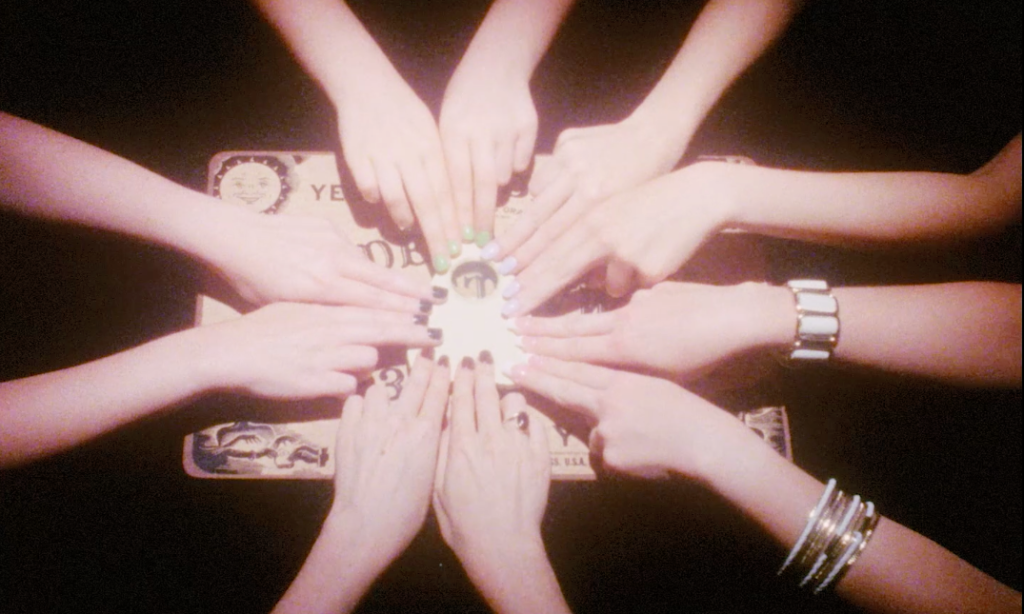
Sunday, February 9 @ 7:30 PM / Music Box Theatre
An Evening of Music and Film with Spektral Quartet, Alex Temple, & Julia Holter
Chicago’s own Spektral Quartet and Chicago Film Society present:
Composer Alex Temple‘s Behind the Wallpaper slips between 19th-century romanticism, indie pop, Weimar cabaret, and Elizabethan music in a tale of mysterious transformation, featuring art-pop luminary Julia Holter.
Capped off with a CFS-curated screening of:
UZI’S PARTY (Lyra Hill, 2017) – 30 min – 16mm
Which of these women is not herself? In this short, experimental teen dramedy, five young women gather on a fated night to consult the Ouija board. They gossip, bicker and flirt until things fall apart. All effects in-camera on 16mm film, shot on spooky locations in Chicago in 2013.
Full Details: https://spektralquartet.com/concerts/2020/2/9/behind-the-wallpaper-at-music-box-theatre
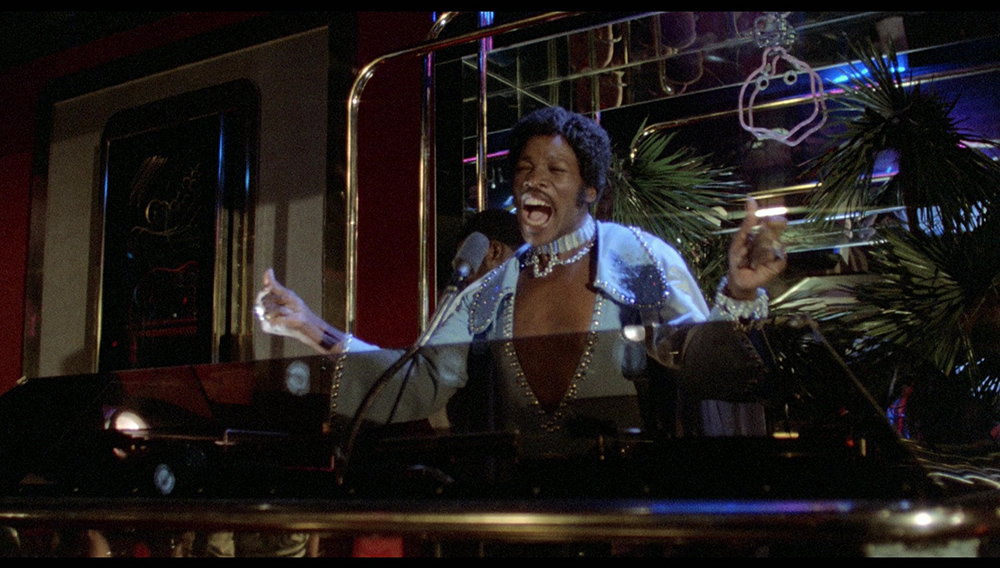
Watch a trailer for DISCO GODFATHER
Monday, February 10 @ 7:00 PM / Music Box Theatre
DISCO GODFATHER
Directed by J. Robert Wagoner • 1979
Copresented with CHIRP Radio 107.1 FM
An iconoclastic, revolutionary comedic voice and independent media mogul, king-of-the-party-record Rudy Ray Moore entered another echelon of cult stardom after decades of underground notoriety with the cycle of wild, unruly, independently produced exploitation pictures in which he starred in the 1970s. After originating the super-pimp folk hero Dolemite and the homicidal stand-up comedian Petey Wheatstraw, a 50-something-year-old Moore found himself closing out his biggest decade by playing a law-abiding citizen for the first time in his career, the titular Disco Godfather, besequined overseer of the hottest dance floor on the West Coast. When his basketball prodigy nephew Bucky ends up in the hospital spun out on angel dust, the Disco Godfather decides it’s up to him to “attack the wack!” and sets about waging a one-man war against the local PCP trade. A vital document of vintage Black disco culture, Disco Godfather would ultimately prove less persuasive as an antidrug PSA than as a vehicle for squelching bouts of unmoored DIY psychedelia set to a series of killer original dance grooves. As an appealingly homemade and fundamentally unserious riff on kung fu and blaxploitation tropes, it also fell in line with Moore’s other independent pictures, more than making up for its budgetary poverty with a goofball exuberance thanks in no small part to the strutting, rapping presence of Moore himself, an electrifying screen personality the American cinema has yet to see the likes of again. (CW)
93 min • Generation International Pictures • 35mm from UNCSA Moving Image Archives, permission Xenon Pictures
Preceded by: Blaxploitation trailer reel — ~10 min — 35mm
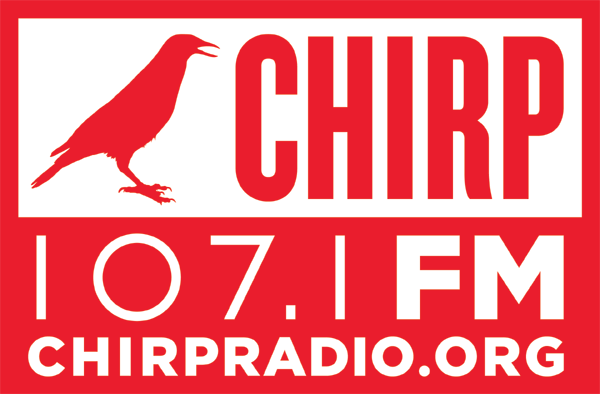
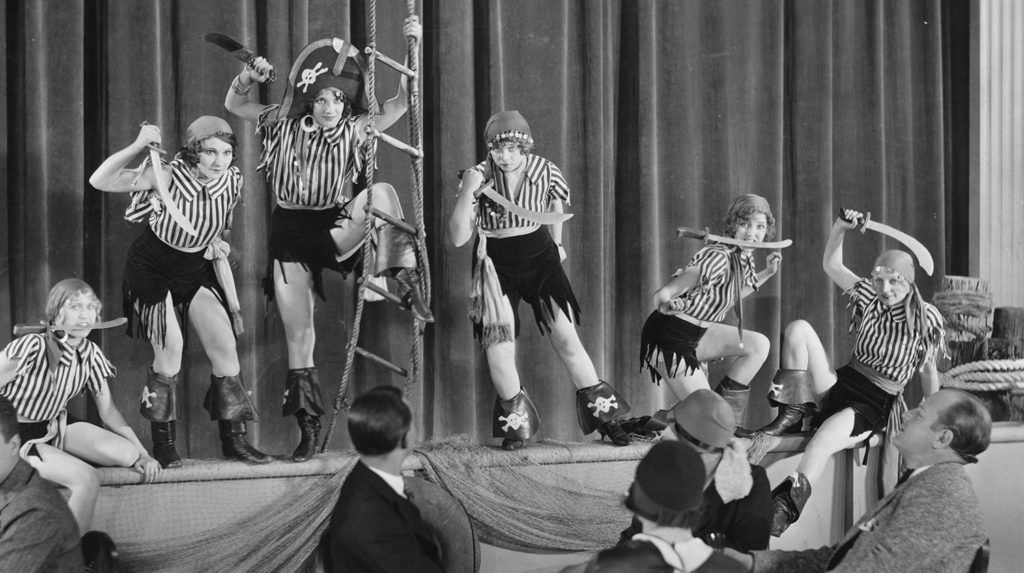
Saturday, February 15 @ 11:30 AM / Music Box Theatre
BARE KNEES
Directed by Erle C. Kenton • 1928
Live organ accompaniment by Dennis Scott
The flapper captured America’s tender imagination in the 1920s, and Hollywood gave the public what it wanted with star showcases such as Olive Thomas’s The Flapper, Clara Bow’s It, and Joan Crawford’s Our Dancing Daughters. Leave it to low-budget independent Gotham Productions to deliver the most whole-hearted endorsement of the archetype in Bare Knees, rated “a good cure for flapper pessimists” by Photoplay. With her modern fashion and penchant for cigarettes, Billie (Virginia Lee Corbin) sticks out from the moment she arrives in Hanford City, a marked contrast to her prim sister Jane (Jane Winton) and her district attorney husband (Forrest Stanley). Billie soon turns the sleepy town upside-down with new uniforms for the women’s softball team and fresh insights into conservative hypocrisy. With no star egos to weigh down the proceedings, Bare Knees emerges as a fleet and crisp time capsule — it’s barely an hour, but it’s crammed with clever wordplay and fiery setpieces. Initially distributed by the fly-by-night Lumas Film Corporation, the film survives thanks to film collector Lou DiCrescenzo, whose nitrate print (snapped up at a flea market for five dollars per reel!) was preserved by the Library of Congress with the support of the Ambler Theater. (KW)
60 min • Gotham Productions • 35mm from Library of Congress
Preceded by: “Ginger Snaps” (Charles Lamont, 1929) – 20 min – 16mm
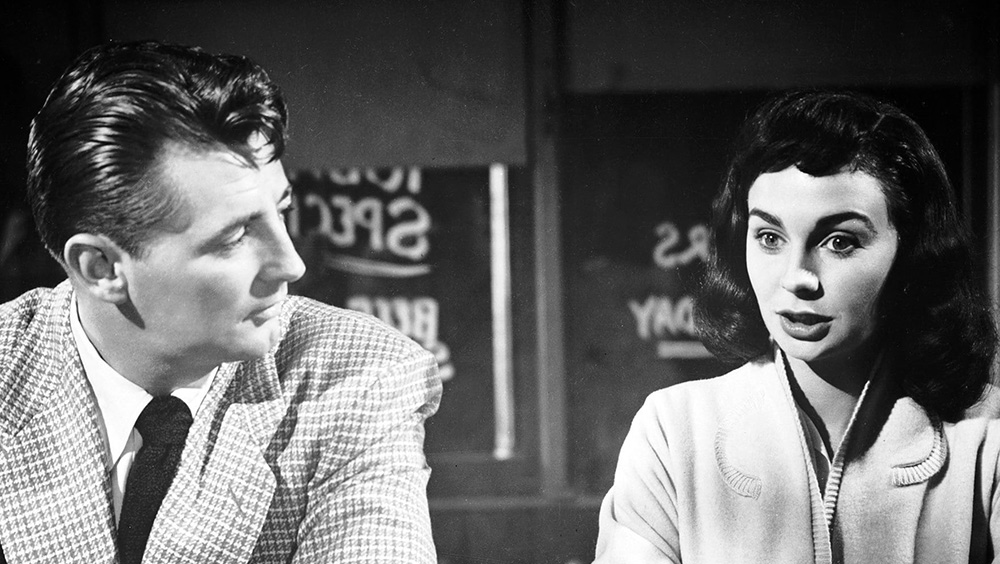
Watch a trailer for ANGEL FACE
Wednesday, February 19 @ 7:30 PM / NEIU
ANGEL FACE
Directed by Otto Preminger • 1953
It begins, like so many film noirs of its era, with a chance meeting: racing enthusiast-cum-ambulance driver Frank (Robert Mitchum) momentarily encounters a haunted young woman (Jean Simmons) after her stepmother is found in a gas-filled bedroom, none of them capable of envisioning the death trip this rendezvous will send all three careening through over the subsequent 80 minutes. Nearly a decade after Otto Preminger distinguished himself as one of the premier stylists of the American crime cinema with his breakout feature Laura, Angel Face saw the director pushing the genre ever further, employing a camera style as winding and unpredictable as the film’s script, and dredging performances out of his leads that more than hinted at the unimaginable wells of pain and trauma beneath their controlled exteriors. Angel Face would moreover distinguish itself from countless other films about hapless working stiffs drawn into lawless worlds via unhealthy passions by treating its standard-issue noir trappings as mostly iconographic, the quickest route to a particularly elemental, drifting fatalism that could make room for countless piano sonatas and a detour into courtroom drama that would serve as a dry run for Preminger’s later landmark Anatomy of a Murder. Rising above it all is Simmons’s variably terrifying and heartrending femme fatale turn, transforming a role that reads on the page like a portrait of avarice (her casting was purportedly at the behest of RKO owner Howard Hughes, who sought to humiliate the actress for spurning his advances) into an arresting study of appetites tragically, pathologically unbound. (CW)
91 min • RKO • 35mm from Warner Brothers
Preceded by: “Sniffy Escapes Poisoning” (Barry Duncan, 1967) – 6 min – 16mm
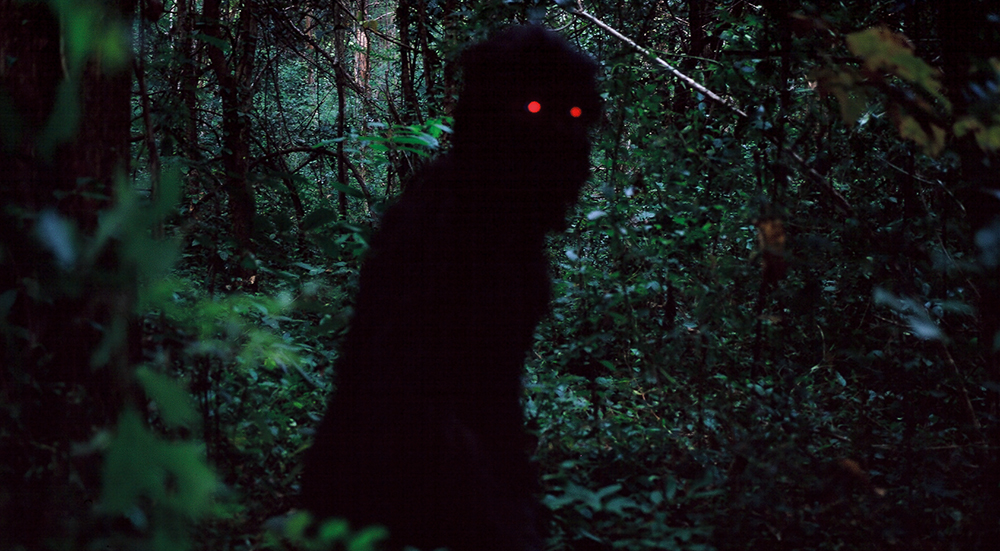
Watch a trailer for UNCLE BOONMEE WHO CAN RECALL HIS PAST LIVES
Wednesday, March 4 @ 7:30 PM / NEIU
UNCLE BOONMEE WHO CAN RECALL HIS PAST LIVES
Directed by Apichatpong Weerasethakul • 2010
In Thai with English Subtitles
If anybody recognizes that cinema is an art form uniquely hospitable to both delicate ruminations on time passed and rubber-suited ghouls, it’s Thai director Apichatpong Weerasethakul. The winner of the 2010 Palme d’Or, Uncle Boonmee found Apichatpong broadening his appeal beyond avid readers of film festival dispatches, pairing an expectedly sensitive study in reincarnation with enough spirits, monsters, and other supernatural phenomena to make the cover of Psychotronic Video. As he faces down an imminent death from kidney failure, the soft-spoken Boonmee (roof welder Thanapat Saisaymar, magnificent in his only screen performance to date) begins preparations for the metaphysical journey that awaits him. In between placid trips out to Boonmee’s farmlands and visits from his family and friends (including the corporeal, deceased, and those transformed into monkey ghosts), Apichatpong takes stock of what could possibly be episodes from past lives lived by Boonmee in passages ranging from banal (such as a farmer looking for a lost ox) to fantastic (as when a princess takes a talking fish for a lover). Shot in beautifully textured Super 16mm to evoke the look of the television productions of Apichatpong’s youth, Uncle Boonmee ends up being a testament to the wide-ranging and thoroughly unpretentious cinephilia of its director, a philosophically rich, millennia-spanning cosmic inquiry with the heart and soul of a creature feature. (CW)
Screening in honor of the 50th anniversary of the Super 16 format!
113 min • Kick the Machine Films • 35mm from Strand Releasing
Short: “Blanket Statement #2: It’s All or Nothing” (Jodie Mack, 2013) – 4 min – 16mm
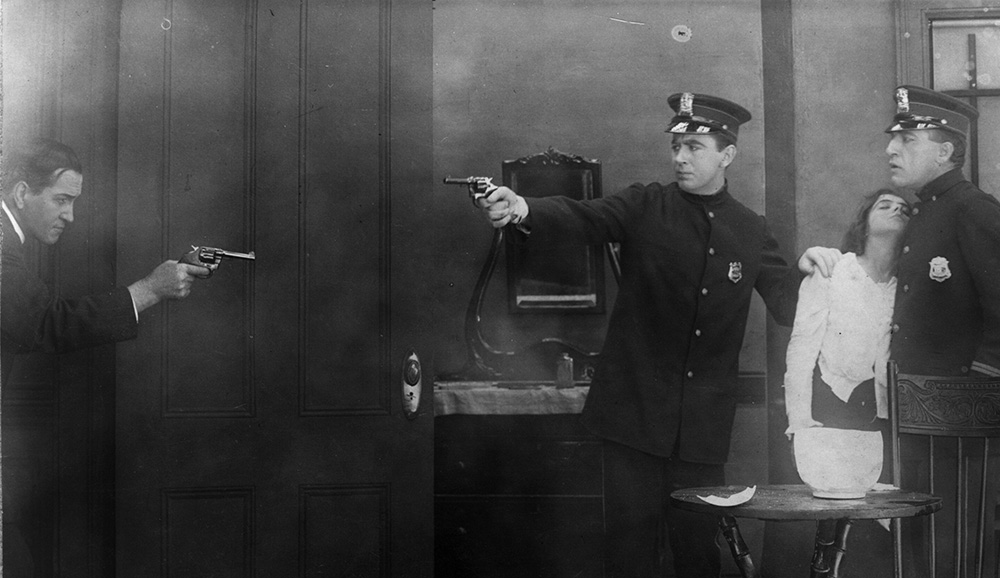
Saturday, March 21 @ 11:30 AM / Music Box Theatre
TRAFFIC IN SOULS
Directed by George Loane Tucker • 1913
Live organ accompaniment by Dennis Scott
The earliest feature films to grace American screens were adaptations of stage productions or spectacles imported from Europe. It’s no wonder that Traffic in Souls, an all-American, effortlessly cinematic blend of thrills, melodrama, and social critique, would stand out like a flare in a tinder box. Promoted as a “full-blooded sermon” that allegedly dramatized the results of a highly-publicized 1910 grand jury investigation into sex trafficking chaired by John D. Rockefeller, Jr., the film follows two sisters who work as shopgirls in a New York candy store: Mary (Jane Gail), who is dating police officer no. 4434 (Matt Moore), and Lorna (Ethel Grandin), who will soon be abducted and deposited at a brothel clandestinely operated by one of the city’s most vocal social reformers. The film’s political sensibility fits squarely within the social concerns of the Progressive Era, but the technology that moves the story forward and exposes the crime ring — dictagraphs, telegraphic pens, secret communication channels — pushes it into the realm of pulp espionage, a runty American cousin of the hyperbolic crime cinema of Louis Feillaude and Fritz Lang, cut to a frenetic tempo that rivals D. W. Griffith. An enormous hit that sold 30,000 tickets on Broadway in its first week of release, inspired a legion of imitators, and became the first feature film to be novelized, Traffic in Souls may be past its centenary, but it’s never stopped to catch its breath. (KW)
75 min • Independent Moving Pictures Company, Incorporated (IMP) • 35mm from Library of Congress
Preceded by: “Love, Speed and Thrills” (Walter Wright, 1915) – 13 min – 16mm
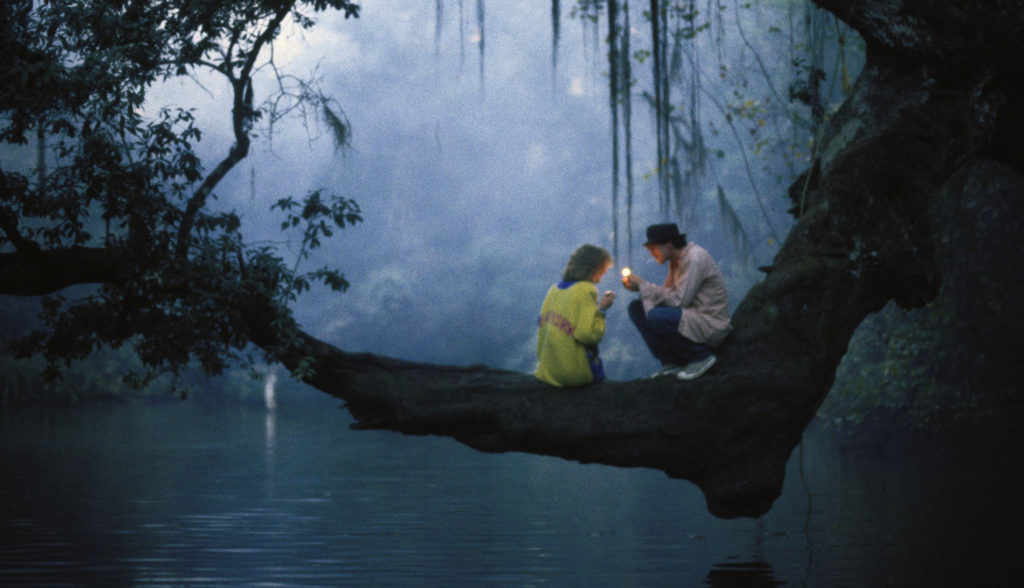
Watch a trailer for SHY PEOPLE
Monday, March 30 @ 7:00 PM / Music Box Theatre
SHY PEOPLE
Directed by Andrei Konchalovsky • 1987
Do you love Deliverance but find it too mannered and insufficiently attentive to mother-daughter dynamics? A lyrical cousin to John Boorman’s tight-lipped landmark of Southern sadism, Shy People is one of the most unclassifiable artifacts of ’80s cinema, a grindhouse melodrama rife with contradictions. The expansive vision of bayou life exudes a bathroom-stall graffiti vibe, but its international pedigree is second-to-none: intermittently ambitious Israeli exploitation mavens Golan and Globus, fresh off their first Oscar-nominated production, Runaway Train, sent that film’s Russian auteur Andrei Konchalovsky to shoot on location in Louisiana, working from a script by Roman Polanski’s frequent collaborator, Frenchman Gérard Brach, and topped it all off with a score from German electronica favorite Tangerine Dream. The cultural dislocation behind the camera is mirrored on screen, with Jill Clayburgh starring as a jet-setting Cosmopolitan journalist whose genealogy research sends her and daughter Martha Plimpton to a haunted swamp, with Louis Vuitton bags and The Cure paraphernalia in tow. There they meet distant relative Barbara Hershey and her unruly brood, who aren’t eager for a family reunion with unscrupulous city folk. Nestled among the trill of mosquitoes and speedboats and Chris Menges’s astonishingly humid ‘Scope cinematography is a surprisingly sensitive study of families and the work required to keep them above water. Hershey won a Best Actress citation at Cannes, but the cash-strapped producers dumped Shy People on the gator circuit for a quick buck. “With slightly different handling,” lamented Roger Ebert, “Shy People could have been a best-picture Oscar nominee.” (KW)
118 min • The Cannon Group • 35mm from Chicago Film Society Collections, permission Park Circus
Short: “Kudzu” (Marjorie Anne Short, 1977) – 16 min – 16mm
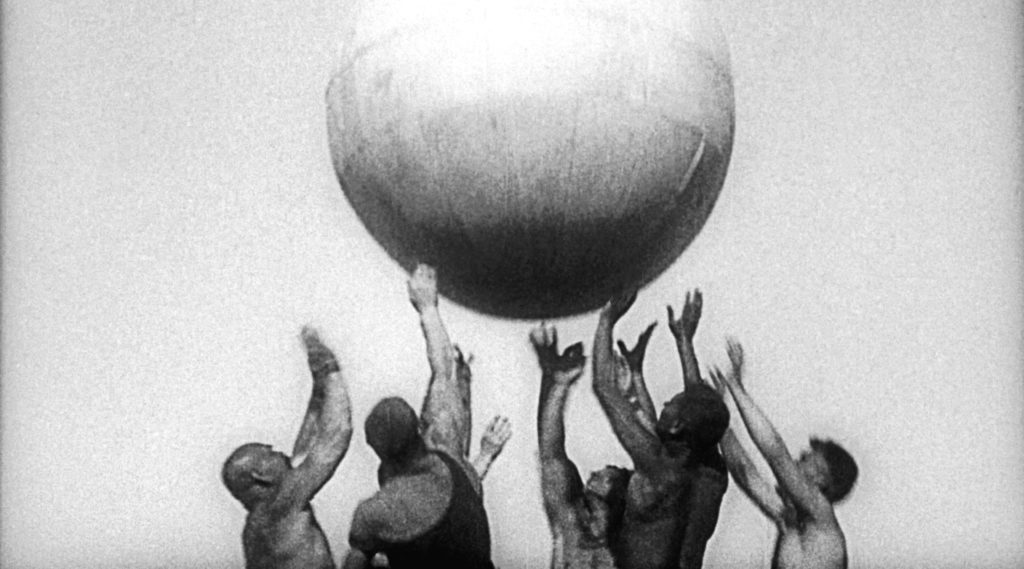
Saturday, April 4 @ 11:30 AM / Music Box Theatre
IN SPRING
Directed by Mikhail Kaufman • 1929
Live organ accompaniment by Dennis Scott
The documentary collective of director Dziga Vertov, his wife and editor Yelizaveta Svilova, and his brother and cinematographer Mikhail Kaufman produced some of the most innovative experiments of the Soviet silent cinema, culminating in The Man With a Movie Camera (1929). An acrimonious split during the postproduction of that film left Kaufman charting his own path, and the result was In Spring, a monumental fresco of life in Kyiv keyed to the changing of the seasons. (The self-reflexive aspects of The Man With a Movie Camera are almost entirely suppressed, though Kaufman delivers a parade of kolkhoz kittens and puppies that more than make up for their loss.) Devoid of intertitles, In Spring literally examines life from the ground up, spiraling out from the soil itself to the modern machines used to cultivate it and the society it sustains. For the film historian Georges Sadoul, the film “made us discover a completely new form of documentary cinema, a cine-poem, where the lyrical theme of thaw and swelling buds conveyed the pathos of the advancement of the USSR towards building socialism without concealing the still existing remnants of the past.” As in the best Soviet-era films, the clamor and color of daily life are marshalled to illustrate Stalinist ideology, but they also transcend its confines, leaving a fecund portrait of a vanished society. Hopefully the snow will have melted on Southport before this one hits the screen. (KW)
60 min • Vufku • 35mm from Yale Film Archive
Preceded by: TBA
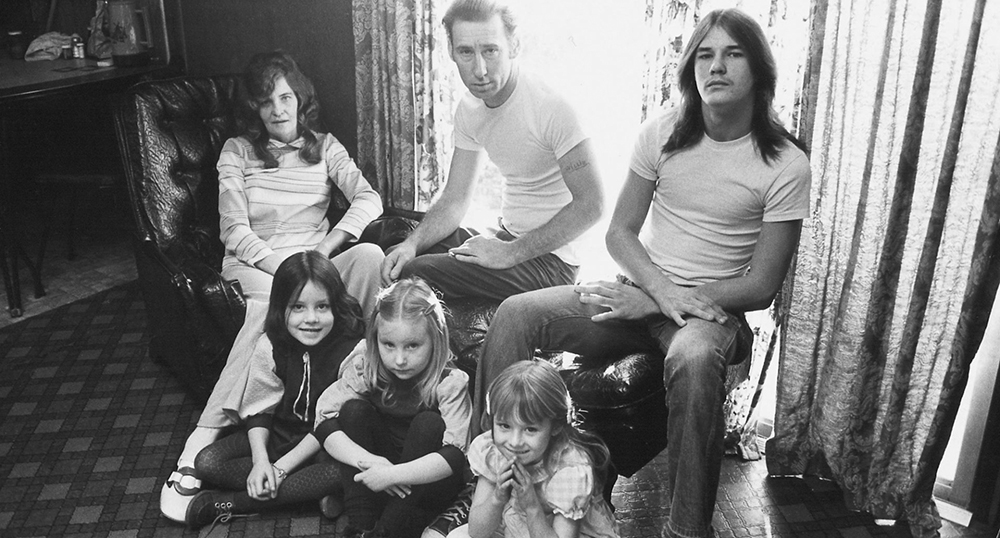
Saturday, April 11 @ 7:00 PM / Chicago Filmmakers
SIX AMERICAN FAMILIES: THE PASCIAK FAMILY OF CHICAGO and THE BURKS OF GEORGIA
Produced in association with the United Church of Christ and the United Methodist Church, the PBS series Six American Families was part of a trend of intensely personal portraits of real people in a candid TV documentary setting (earlier examples included PBS’s An American Family and WCBS’s A Woman Is). More than 200 families were considered for the project, and the six finalists were interviewed for several weeks. The edited footage was then shown to the families, and their reactions and thoughts were included in the finished films. The first of the series, “The Pasciak Family of Chicago” (Mark Obenhaus, 1977, 58 min) follows a working-class Polish family dealing with intergenerational differences in values and the loss of cultural traditions around Christmas. “The Burks of Georgia” (Albert and David Maysles, 1978, 55 min) follows the three generations and thirteen children that make up the Burk family, living in rural Georgia in severe poverty. About as honest and empathetic as television can get, Six American Families was made with virtually no distance between the filmmakers and their subjects. The New York Times noted “The television documentary may be on the verge of mass acceptance as a tool in a process somewhere between self-analysis and group therapy. The average citizen’s willingness to display private feelings on a public screen is startling.” Though originally conceived for television, these 16mm prints come to us by way of deaccessioned university library collections, often a “second run” venue for public television documentaries. (JA)
Total Runtime – 113 min • Public Broadcasting Corporation • 16mm from Chicago Film Society Collections
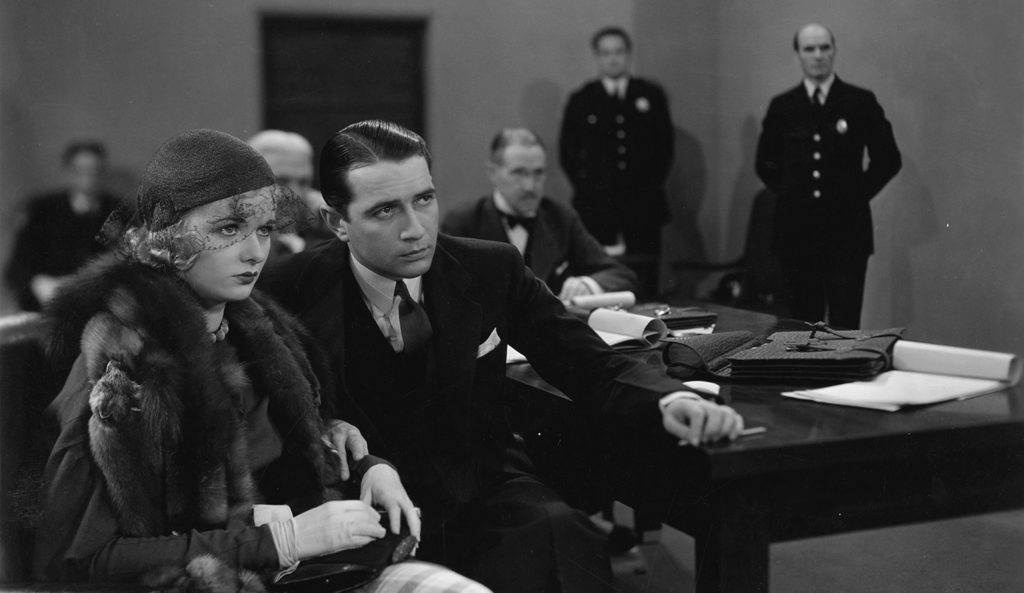
Wednesday, April 15 @ 7:30 PM / NEIU
THE TRIAL OF VIVIENNE WARE
Directed by William K. Howard • 1932
It’s disorder in the court at the case of Vivienne Ware (played by Joan Bennett), who is on trial for the murder of her two-timing ex-fiance, architect Damon Fenwick (Jameson Thomas). Knives fly, windows shatter, and guns fire as ZaSu Pitts narrates the proceedings in real time for New York’s gossipy radio audience. Fast-screaming lawyers (including Vivienne’s true love, defense attorney John Sutherland) interrogate dim-witted witnesses, and several flashbacks fill in the gaps. Adapted from a six-night radio serial program which aired on New York’s NBC affiliate WJZ, The Trial of Vivienne Ware combines the nail-biting suspense of radio melodrama with the magic of wackadoo pre-Code film editing. An early contender for the fastest movie ever made, the film contains an astonishing 72 whip pans (by our estimate) in under an hour, and moves so fast you’ll want to watch it a second time. Presented with WDCB’s Those Were The Days in honor of the show’s upcoming 50th anniversary! Preserved by The Museum of Modern Art with support from the Celeste Bartos Fund for Film Preservation. (JA)
56 min • Fox • 35mm from the Museum of Modern Art, Permission Criterion Pictures, USA
Preceded by: The Three Stooges in “Microphonies” (Edward Bernds, 1945) – 17 min – 16mm
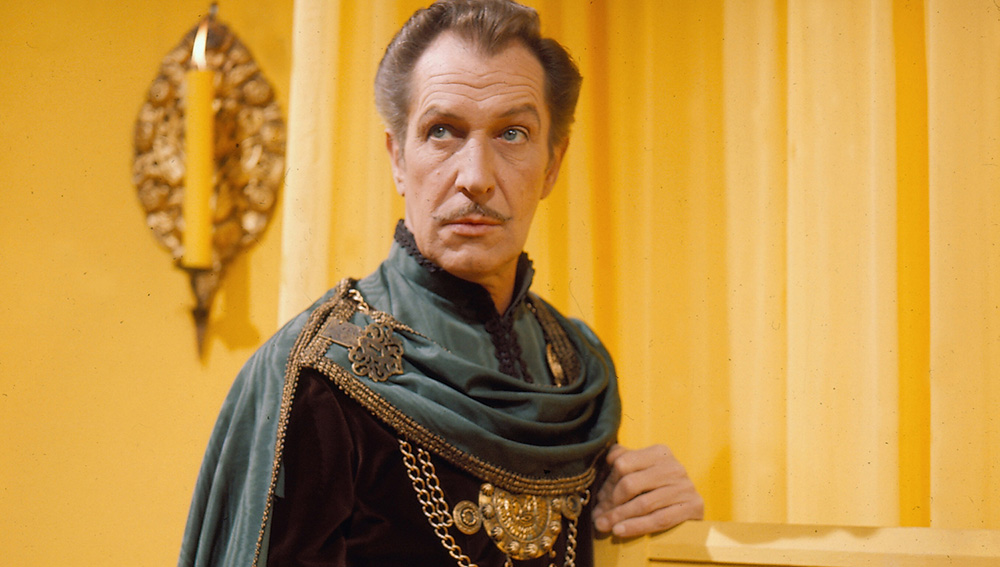
Watch a trailer for THE MASQUE OF THE RED DEATH
Monday, April 27 @ 7:00 PM / Music Box Theatre
THE MASQUE OF THE RED DEATH
Directed by Roger Corman • 1964
Between 1960 and 1965 Roger Corman, master of exploitation filmmaking and financing, made a string of eight films for low-budget powerhouse American International Pictures from unusual source material, the decidedly antiquarian (and public domain!) short stories of 19th century writer Edgar Allan Poe. The seventh of these films, a comparatively more expensive production (only by Corman’s standards, mind you), is a medieval tale of a villainous prince and his castle guests attempting to outwit and outwait the mysterious “red death” ravaging the countryside around them. They pass the time with sadomasochistic masquerade balls and satanic rituals (“let me speak to you about the anatomy of terror” is a party pick-up line for the ages), but even deals with the devil may not be enough when the plague without becomes the plague within. Vincent Price is truly at home as Prince Prospero, a genteel monster who enjoys commanding his party guests to bark like dogs and mansplaining Satanism to Francesca, a young God-fearing girl he’s kidnapped from the village, played by a wide-eyed 19-year-old Jane Asher. Masque is spellbinding, wicked, and unabashedly indulgent — a groovier, trashier Powell & Pressburger film with comically large candles, ludicrous hats, and dripping dungeons for days. Scripted by Twilight Zone stalwart Charles Beaumont and shot in dazzling color by cinematographer-turned-director Nicolas Roeg. Restored by the Academy Film Archive and The Film Foundation, with funding provided by the George Lucas Family Foundation (RL)
90 min • American International Pictures • 35mm from the Academy Film Archive, permission Park Circus
Preceded by: “Bimbo’s Initiation” (Fleischer Studios, 1931) – 16mm – 7 min
Heartfelt Thanks to Shayne Pepper, Michael Hines, Kyle Burke, Cyndi Moran, Robert Ritsema, Ernie Kimlin, Chris Rodriguez, & Asher Waldron of Northeastern Illinois University; Brian Andreotti & Ryan Oestreich of the Music Box Theatre; Brenda Webb & Devon Coffee of Chicago Filmmakers; Randy Andrews of Swank Motion Pictures; David Antos & Chris Omiotek; Brian Belovarac & Ben Crossley-Marra of Janus Films; James Bond of Full Aperture Systems; Antonella Bonfanti & Seth Mitter of Canyon Cinema; Jiayi Chen; Dennis Chong, Jesse Chow, Liam Berney, Jason Jackowski, & Eric Chin of Universal; Chris Chouinard of Park Circus; Amy Crismer of Disney; Steve Darnall of Those Were The Days; Jon Davison; Sebastian del Castillo of the American Genre Film Archive; Justin Dennis of Kinora; Katherine Greenleaf; Cary Haber of Criterion Pictures, USA; Lyra Hill; Matt Jones of the University of North Carolina School of the Arts; Thad Komorowski; Steven Lloyd; Edda Manriquez & Charles Rogers of the Academy Film Archive; Brian Meacham of the Yale Film Archive; Bradley Morgan of CHIRP 107.1 FM; Kristie Nakamura & Nicole Woods of Warner Bros. Classics; Dennis Scott; Lynanne Schweighofer, Rob Stone, & Mike Mashon of the Library of Congress; Tommy Jose Stathes; Katie Trainor & James Layton of the Museum of Modern Art; Kiyan Warner; Nancy Watrous, Matt Schwarz, & Olivia Babler of Chicago Film Archives; Todd Wiener & Steven K. Hill of UCLA Film & Television Archive; Gabriel Wallace; Mike Williams of Strand Releasing. Particular thanks to CFS research associate Mike Quintero, CFS board members Mimi Brody, Steven Lucy, Brigid Maniates, & Artemis Willis, & CFS advisory board members Brian Block, Lori Felker, & Andy Uhrich.
And extra special thanks to our audience, who make it all possible!
